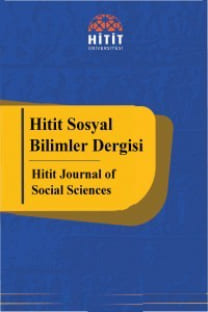ENFLASYONUN FİNANSAL PİYASALARIN VOLANTİLİTESİNE ETKİSİ: BORSA İSTANBUL ÜZERİNE BİR UYGULAMA
Bu çalışmanın amacı enflasyonun hisse senedi piyasasının volatilitesine etkisini Türkiye bağlamında analiz etmektir. Söz edilen etkiyi araştırmak için aylık frekanstaki BIST-100 endeksi ve tüketici fiyatı endeksine GARCH modeli 1986-2016 kapsamında uygulanmıştır. Enflasyonun etkisini daha derin analiz edilebilmesi için fiyat endeksinin yüksek olduğu dönem ile enflasyonun tek haneye düştüğü dönem ayrı ayrı analiz edilmiştir. Bulgular enflasyonun, enflasyon oranının yüksek olduğu dönemde borsanın volatilitesini arttırdığını göstermiştir. Diğer taraftan fiyat istikrarının sağlandığı dönemde enflasyon ve volatilite arasında anlamlı ilişkiye rastlanmamıştır. Sonuçlar enflasyonun artık Türkiye borsasında bir risk faktörü olmadığını ima etmektedir.
___
- ALAGİDEDE, Paul, and Theodore PANAGİOTİDİS. 2012. “Stock returns and inflation: Evidence from quantile regressions.” Economics Letters 117(1), 283-286.
- ALİYU, Shehu Usman RANO. 2012. “Does inflation have an impact on stock returns and volatility? Evidence from Nigeria and Ghana.” Applied financial economics, 22(6), 427-435.
- AL-SHARKAS, Adel A., and Marwan AL-ZOUBİ 2013. “Stock Prices and Inflation: Evidence from Jordan, Saudi Arabia, Kuwait, and Morocco”. Journal of International Business Research, 12(1), 23.
- AUSTİN, Adrian, and Swarna DUTT. 2015. “Do stock returns hedge inflation at long horizons ?” Applied Economics Letters, 1-4.
- BOLLERSLEV, Tim. 1986. “Generalized autoregressive conditional heteroskedasticity.” Journal of econometrics, 31(3), 307-327.
- BOZKURT, İbrahim. (2015). Finansal İstikrar İle Cds Primleri Arasındaki İlişkinin Bulanık Regresyon Analizi İle Tespiti: Türkiye Örneği. Gümüshane Üniversitesi Sosyal Bilimler Enstitüsü Elektronik Dergisi,6(13)
- CHOUDHRY, Taufiq. 2001. “Inflation and rates of return on stocks: evidence from high inflation countries.” Journal of International Financial Markets, Institutions and Money, 11(1), 75-96.
- CIFTER, Atilla. 2015. “Stock returns, inflation, and real activity in developing countries: A Markov-switching approach.” Panoeconomicus, 62(1), 55-76.
- DAVİS, Nicole, and Ali M. KUTAN. 2003. “Inflation and output as predictors of stock returns and volatility: international evidence.” Applied Financial Economics, 13(9), 693-700.
- ENGLE, Robert F., and J. Gonzalo RANGEL. 2005. “The Spline GARCH Model for Unconditional Volatility and its Global Macroeconomics Causes.” p Mimeo, NYU and UCSD.
- EVBAYİRO-Osagie, Esther I., and F. K. EMENİ. 2015. “Inflatıon Rates, Financial Openness, Exchange Rates And Stock Market Returns Volatility In Nigeria.” Ican Journal Of Accounting & Finance, 4(1), 125-140.
- FUNKE, Nobert, and Andrea GOLDSTEİN. 1996. “Financial market volatility.” Intereconomics, 31(5), 215-220.
- GULTEKIN, Bülent. 1983.“Stock market returns and inflation: evidence from other countries.” The Journal of Finance, 38(1), 49-65.
- KUMARI, Jyoti .2011. “Stock Returns and Inflation in India: An Empirical Analysis.” The IUP Journal of Monetary Economics, 9(2).
- MAGHYEREH, Aktham. 2006. “The long-run relationship between stock returns and inflation in developing countries: further evidence from a nonparametric cointegration test.” Applied Financial Economics Letters, 2(4), 265-273.
- RASHİD, Muhammad Tahir. 2011. “Measuring the Impact of Inflation on Conditional Stock Market Volatility in Pakistan: An Application of GARCH Model.” Middle Eastern Finance and Economics, 13, 36-42.
- SARYAL, Fatma. Sonmez. 2007. “Does inflation have an impact on conditional stock market volatility?: Evidence from Turkey and Canada.” International research journal of finance and economics, 11, 123-133.
- SCHWERT, William. 1989. “Why does stock market volatility change over time?” The journal of finance, 44(5), 1115-1153.
- ZAKARIA, Zukarnain, and Sofian SHAMSUDDIN .2012. “Empirical evidence on the relationship between stock market volatility and macroeconomics volatility in Malaysia.” Journal of Business Studies Quarterly, 4(2), 61.
- ZUMBACH, Gilles. 2004. “Volatility processes and volatility forecast with long memory”. Quantitative Finance, 4(1), 70-86.
- WORLD BANK (2016), “İstatistikleri”, (erişim adresi: www.worldbank.org), (erişim tarihi: 25.02.2016)
- Yayın Aralığı: Yılda 2 Sayı
- Başlangıç: 2008
- Yayıncı: Hitit Üniversitesi
Sayıdaki Diğer Makaleler
TÜRKİYE'DE MUHAFAZAKÂR KESİMİN DEĞİŞEN HAYAT TARZI
Burcu ORALHAN, Sevgi SÜMERLİ SARIGÜL
16. YÜZYIL ÇORUM NAHİYESİ'NDE NÜFUS VE YERLEŞİM ÖZELLİKLERİ
LİSE ÖĞRENCİLERİNİN BİYOLOJİK ÇEŞİTLİLİK İLE İLGİLİ BİLGİLERİ VE DAVRANIŞ EĞİLİMLERİ
LORD OF THE FLIES ÇEVİRİLERİNDE KAYNAK / HEDEF ODAKLI EĞİLİMLER
ŞEYHÜLİSLAM YAHYA DİVANINDA DENİZ İMGESİ
MURAT GÜLSOY’UN “BABA OĞUL VE KUTSAL ROMAN” ADLI ESERİNDE YAPI VE SİMGELER
